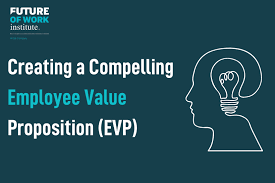Employee Value Proposition: Crafting a Compelling EVP to Attract, Retain, and Engage Talent
In today’s hyper-competitive labor market, businesses face the dual challenge of attracting top talent while simultaneously ensuring that they retain their best employees. One of the most powerful tools organizations have in achieving this goal is a strong Employee Value Proposition (EVP). But what exactly is an EVP, and why is it so crucial for companies aiming to build a dedicated, loyal, and high-performing workforce?
An Employee Value Proposition is the unique set of benefits, rewards, experiences, and values that a company offers its employees in exchange for their skills, expertise, and commitment. The EVP serves as the “deal” that an employer makes with its workforce, providing a clear understanding of what employees can expect to gain from their relationship with the company, and what the company expects from them in return.
Crafting a compelling EVP is not just about offering competitive salaries or great benefits—it’s about creating an environment that aligns with employees’ personal and professional aspirations. It involves offering opportunities for career growth, fostering an inclusive culture, promoting work-life balance, and ensuring that employees feel valued and appreciated. When executed effectively, a strong EVP becomes a key differentiator in a crowded job market, helping organizations not only to attract top-tier talent but also to retain them for the long term.
In this article, we will delve into the importance of the Employee Value Proposition, its key components, how to develop an EVP that resonates with your employees, and how it impacts your employer brand. By the end of this guide, you’ll have a thorough understanding of how to create an EVP that can truly set your organization apart.
The Role of EVP in Talent Acquisition and Retention
A well-crafted EVP serves as the cornerstone for building a strong employer brand. It shapes the overall employee experience and directly influences how prospective and current employees perceive the company. A strong EVP can serve as a powerful magnet for attracting top talent and as a key factor in employee retention. Let’s explore why it’s so critical for organizations today.
What Makes a Strong EVP?
A strong Employee Value Proposition is comprehensive, clear, and compelling. It goes beyond just the promise of a paycheck and vacation days. It encapsulates every element of the employee experience, from the culture of the company to the opportunities for personal and professional growth. A good EVP addresses the following key areas:
- Compensation and Benefits
- Career Development and Growth Opportunities
- Work-Life Balance
- Company Culture and Values
- Recognition and Rewards
- Health and Wellness
- Leadership and Management Style
- Employee Empowerment
Each of these areas plays an important role in ensuring that employees feel supported, engaged, and motivated to perform at their best.
The Impact of EVP on Employer Branding
Your Employer Brand is the perception that current and potential employees have about your company as a place to work. It reflects how employees experience your organization, your leadership style, your values, and your overall work environment. A compelling EVP is a critical element of employer branding, and it directly impacts your company’s reputation in the job market.
A strong employer brand driven by a well-defined EVP helps attract the right candidates to your company, those who are a cultural fit and who share your values. It also builds trust with existing employees, strengthening their commitment and engagement with the organization.
Components of a Strong Employee Value Proposition
A well-rounded Employee Value Proposition includes multiple components that resonate with the needs, desires, and motivations of employees. These components go beyond just compensation and touch on the deeper aspects of the employee experience.
1. Competitive Compensation and Benefits
The compensation package forms the foundation of any EVP. Salary, bonuses, stock options, health benefits, retirement plans, and other financial incentives contribute to the overall offer. However, the EVP goes beyond just providing a paycheck—it’s about offering competitive pay that aligns with industry standards, alongside benefits that provide real value to employees.
2. Career Growth and Development Opportunities
Top talent values career progression and continuous learning. Offering employees opportunities for skill development, leadership training, and career advancement can set your organization apart from others. Organizations that invest in their employees’ development show a genuine interest in their long-term success.
3. Work-Life Balance
With the rise of remote work and flexible schedules, work-life balance has become a top priority for many employees. Providing flexibility in work hours, allowing for remote work options, and respecting personal time are essential elements of an attractive EVP. Employees who feel they can manage both their personal and professional lives are more likely to stay engaged and loyal to the company.
4. Company Culture and Values
A positive and inclusive company culture is a major selling point for job seekers today. Employees want to work for organizations that align with their personal values and promote a sense of belonging. Your EVP should reflect the culture you’ve built—whether that’s one focused on innovation, teamwork, diversity, or social responsibility.
5. Recognition and Rewards
Employees want to be recognized for their hard work and achievements. Recognition can come in many forms: from formal awards to informal shout-outs during meetings. When employees feel valued and their contributions are appreciated, they are more likely to stay motivated and committed to their roles.
6. Health and Wellness Programs
Employees are increasingly looking for employers who care about their well-being. Health and wellness programs that support mental, physical, and emotional health are crucial elements of an EVP. Offering gym memberships, mental health resources, and wellness initiatives not only improves employee satisfaction but can also boost productivity and engagement.
7. Leadership and Management Style
Leadership plays a critical role in employee satisfaction and retention. An EVP should highlight the company’s leadership style, whether it’s empowering employees, promoting transparency, or offering mentorship and guidance. Employees are more likely to stay in organizations where they feel supported and valued by their managers.
8. Employee Empowerment
An EVP that emphasizes empowerment allows employees to take ownership of their roles and decisions. Employees who feel they have the autonomy to make meaningful contributions are more engaged and motivated to succeed. Empowerment fosters a sense of pride and ownership, which leads to higher job satisfaction and performance.
9. Social Responsibility and Community Engagement
Many employees today seek to work for companies that align with their ethical values. A strong EVP that highlights corporate social responsibility initiatives—such as sustainability efforts, charitable work, and community outreach—can be a powerful attractor for employees who want to make a positive impact in the world.
10. Workplace Environment
A comfortable and engaging workplace is a key part of the EVP. Whether it’s a modern office space, collaborative work areas, or remote-friendly technology, creating an environment where employees feel comfortable and motivated is crucial. The workplace should reflect the company’s values and culture, supporting creativity, collaboration, and well-being.
11. Job Security and Stability
Employees value stability, especially in uncertain times. An EVP that emphasizes the company’s growth potential, stability, and long-term vision helps build trust and confidence among employees. When employees feel secure in their roles, they are more likely to be engaged and loyal to the company.
12. Work Relationships and Team Dynamics
The relationships employees have with their coworkers and managers play a significant role in their overall satisfaction. An EVP should reflect the collaborative nature of your organization, highlighting teamwork, mentorship, and opportunities for building strong professional relationships.
13. Innovation and Impact
Employees want to feel like their work has meaning and that they are contributing to something important. Your EVP should reflect the innovative nature of your organization and the impact employees can have in their roles. Providing employees with opportunities to work on challenging projects or initiatives that make a difference can increase job satisfaction and retention.
14. Transparent Communication
Open and honest communication is key to fostering trust and engagement. A strong EVP includes clear and transparent communication from leadership regarding company goals, strategies, and changes. Employees who feel informed and involved are more likely to feel invested in the company’s success.
15. Employee Well-being Programs
A comprehensive well-being program—focused on mental, physical, and emotional health—can be a powerful differentiator for your EVP. Programs that provide support for stress management, work-life balance, and overall wellness not only improve employee satisfaction but also reduce burnout and absenteeism.
16. Diversity and Inclusion Initiatives
An inclusive and diverse workplace fosters creativity, innovation, and employee satisfaction. Employees want to feel accepted and respected, regardless of their background. A strong EVP that emphasizes diversity and inclusion attracts employees who value a workplace where everyone is treated fairly and with respect.
17. Learning and Development
Top talent values continuous learning and development. An EVP that emphasizes access to training, certifications, and skill-building opportunities can help attract and retain employees who are looking to grow in their careers.
18. Rewards and Incentives for High Performers
High-performing employees want to be rewarded for their contributions. Offering performance-based incentives, bonuses, and recognition for exceptional work can help retain top talent and motivate employees to perform at their best.
19. Job Role Clarity
An EVP should include clear expectations regarding job responsibilities, growth paths, and career progression. Employees who understand their roles and know how they can advance within the company are more likely to stay engaged and motivated.
20. Flexibility in Career Pathing
Employees appreciate flexibility in their career development. Offering opportunities for lateral moves, cross-functional training, or internal job rotations gives employees the chance to explore different areas of the business and find the best fit for their skills and passions.
FAQ
What is the difference between an Employee Value Proposition (EVP) and Employer Branding?
An Employee Value Proposition (EVP) refers specifically to the benefits, rewards, and experiences that an organization offers its employees. It is essentially the “deal” between the employer and employee. Employer branding, on the other hand, refers to the external perception of the company as an employer. While EVP shapes the internal employee experience, employer branding communicates this experience to




